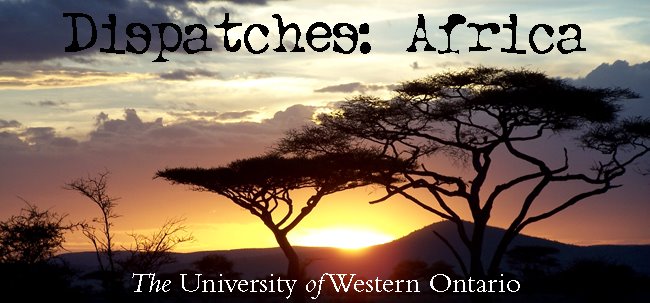
Kitabi, Rwanda – As the last Saturday of the month yesterday, the country came alive for mandatory community work Rwandans call umuganda. Young and old, weak and strong flooded the streets and hills with hoes, picks and other tools. Colourful toques and a rainbow of kangas dotted the landscape like a vast garden of flowers.
Organized at the local cell level (umudugudu), umuganda brings the community together to identify, and act upon, development activities that will improve their areas. Many such initiatives are related to issues of sanitation, security and the construction of water channels.
Community members will typically work throughout the morning until 10, before attending meetings until noon. It’s at these meetings that further development opportunities are identified, and where the community discusses issues related to family planning, healthcare, local politics and security. Funds are also collected for security (approximately 1,000 FRw – $2 – apiece to pay for local police) and for garbage removal (another 1,000 FRw).
It was also the first time since my arrival in Rwanda that I noted a complete absence of buses on the roads. Apart from the buzz of people when passing through a community, the air was silent. By law, they’re not allowed to run until noon as everyone is to be engaged in umuganda.
I can see benefits of such a concept in North America. Beyond community building, it could provide us with an opportunity to clean up our environment and to approach our world a little more selflessly. We may not have the same needs to build ditches, but whether it’s picking trash out of them, or planting trees, it could still provide us with an opportunity to better our communities.
And ourselves.
Organized at the local cell level (umudugudu), umuganda brings the community together to identify, and act upon, development activities that will improve their areas. Many such initiatives are related to issues of sanitation, security and the construction of water channels.
Community members will typically work throughout the morning until 10, before attending meetings until noon. It’s at these meetings that further development opportunities are identified, and where the community discusses issues related to family planning, healthcare, local politics and security. Funds are also collected for security (approximately 1,000 FRw – $2 – apiece to pay for local police) and for garbage removal (another 1,000 FRw).
It was also the first time since my arrival in Rwanda that I noted a complete absence of buses on the roads. Apart from the buzz of people when passing through a community, the air was silent. By law, they’re not allowed to run until noon as everyone is to be engaged in umuganda.
I can see benefits of such a concept in North America. Beyond community building, it could provide us with an opportunity to clean up our environment and to approach our world a little more selflessly. We may not have the same needs to build ditches, but whether it’s picking trash out of them, or planting trees, it could still provide us with an opportunity to better our communities.
And ourselves.


No comments:
Post a Comment